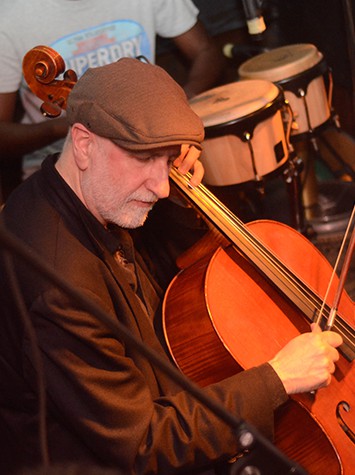When we found out that Eugene Friesen was going to perform in Cairo, our hearts skipped a beat. The brilliant cellist’s concert was organized by Izdehar and sponsored by Hisene. Eugene is a cellist whose innovative style has gotten him a lot of attention since he started out. Now, at 62, he still rocks out with his classical instrument. He has won four Grammy awards, collaborated with Dream Theater and countless orchestras, and still teaches until today. In Egypt, he has done workshops with some of Egypt’s young musical talents. He also performed in both Cairo Jazz Club and the Cairo Opera House. Thus demonstrating the full range of musical diversity he has tucked up his talented sleeve.
Why the cello?
Well, when I was little I didn’t actually know what a cello was. It was my father who told me to ask for one. Whether there’s some angel watching over you that finds the right instrument for you, or you get an instrument and your psychology bends towards it. I’m not sure which one of those to go, but it seems to work for me.
What you’re doing is something between Yo Yo Ma and Apocalyptica.
(Laughs) I think that’s good! I don’t mind that. I get it. It’s an amazing time right now, because more and more players of symphonic instruments are looking and working for liberation. They’re looking for the license to be creative and to find their own context for letting their own creative instincts go free.
Is this what you’ve always wanted to do?
Yeah, I always wanted to do this since I was 13 years old; ever since I heard the Beatles for the first time.
Were you ever questioned or criticized because you’re not only sticking to classical music?
Of course! I mean, I’ve had some for a couple of decades now. I think anybody who’s tried new things at some point had some arrows in their back.
Do you think the cello, or classical instruments in general, are overlooked in favor of mainstream music?
I think in the past that was more of a problem. I don’t think the audiences care anymore. I think they just care about the music, and about seeing a personality that’s freeing with an instrument with their expression. Many of the people who play pop music are self-taught. And in a way being self-taught is a great advantage because there’s stuff in our classical training that can actually keep us inhibited. Whereas if you just pick up and instrument, teach it to yourself and start playing the music that you love listening to, sometimes, you can have a more direct connection with your music.
Eicca Toppinen from Apocalyptica once said “in order to play like we play, you need to learn to play the cello correctly first, then throw it out the window”. Have you felt this way about the way you play the cello?
I don’t think it’s absolutely true, no. I used to, before I started teaching at the Berklee College of Music in Boston. I did believe that. I thought that you had to be classically trained. But I don’t believe that anymore. Because I’ve seen kids who don’t know anything about classical music pick up the cello and do amazing things with it. They can play it dirtier, they can play it bluesier, they can play with a greater swing feel and rock harder than anybody who studied classical. I don’t think that’s 100% true anymore.
There are lots of acts that mix classical music with pop music, heavy metal or comedy – something that you’ve been doing for a while – how do you feel when you see acts like that?
I think it’s great! I think there’s much creativity that can be applied and it’s wonderful.
Some legendary cellists never write anything of their own. Someone like Jacqueline Du Pre for example did that. What do you think separates a good cellist from a good music writer?
I think the only separation is that to play like some of the very greatest cello performers – and Jacqueline Du Pre was one of them – it requires such an incredible devotion to the instrument. In a way it’s a kind of selfless devotion, where all her work is dedicated to bringing out the compositions of other people. I don’t think it means that she was not creative. I think you can be very creative and have an active musical imagination in the service of interpretation.
You’ve won 4 Grammy Awards, you’re quite popular, yet you still teach. Where does this passion for teaching come from?
I get a lot of energy from my students. Not only do I love to be around young people who are passionate about music, but I also hear a lot of music that they love that inspires me. And some of my favorite work right now is finding ways to support these young musicians, and making their musical dreams come true. At this point, that just gives me great satisfaction. Anything I can do to encourage a talented kid and to support creativity in a young musician is really my mission at this point.
I’ve noticed you have free studying material on your website. Has the internet and social media affected your career as a musician or a teacher?
Oh definitely! My God, it’s so powerful. A clever video on YouTube is way more effective in promoting your career than a review in the New York Times now. It’s way more effective. Those Two Cellos, those guys are great examples of that. They’ve put their energy into making those clever videos. And at this point they’re traveling all over the world. They’re opening for people like Elton John!

